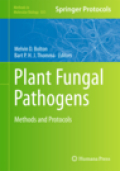
Plant fungal pathogens: methods and protocols
Bolton, Melvin D.
Thomma, Bart P.H.J.
Over the course of evolution, fungi have adapted to occupy specific niches, from symbiotically inhabiting the flora of the intestinal tract of mammals to saprophytic growth on leaf litter resting on the forest floor. In Plant FungalPathogens: Methods and Protocols , expert researchers in the field detail many of the methods which are now commonly used to study fungal plant pathogens. These include methods and techniques for model systems such as Arabidopsis thaliana as well as crop plants, aspects of fungal biology, genome annotation, next-generation sequencing, and fungal transformation and molecular tools for disease and/or pathogen quantification that are critical for revealing the role for a fungal gene of interest in disease development. Written in the highly successful Methods in Molecular Biology™ series format, chapters include introductions to their respective topics, lists of the necessary materials and reagents, step-by-step, readily reproducible laboratory protocols, and key tips on troubleshooting and avoiding known pitfalls. Authoritative and practical, PlantFungal Pathogens: Methods and Protocols seeks to aid scientists in the further study in current techniques that cover a wide-range of methods to study molecular aspects of pathogenesis. Highlights the latest techniques for the study of molecular plant pathology. Provides step-by-step detail essential for reproducible results. Contains key notes an implementation advice from the experts. INDICE: Fungal ABC Transporter Deletion and Localization Analysis. Targeted Gene Replacement in Fungal Pathogens via Agrobacterium tumefaciens Mediated Transformation. Activity-based Protein Profiling of Infected Plants. The use of Agroinfiltration for Transient Expression of Plant Resistance and Fungal Effector Proteins in Nicotiana benthamiana Leaves. Proteomic Techniques for Plant-Fungal Interactions. Identification of HR-inducing cDNAs from Plant Pathogensvia a Gateway®-Compatible Binary Potato Virus X-Expression Vector. Freeze-Fracture of Infected Plant Leaves in Ethanol for Scanning Electron Microscopic Study of Fungal Pathogens. Real-time PCR for the Quantification of Fungi in planta. Using Non-homologous End-joining-deficient Strains for Functional Gene Analyses in Filamentous Fungi. Atomic Force Microscopy (AFM): A Tool for StudyingBiophysical Surface Properties Underpinning Fungal Interactions with Plants and Substrates. Use of the Yeast Two-Hybrid System to Identify Targets of Fungal Effectors. Characterization of Plant - Fungal Interactions Involving Necrotrophic Effector-Producing Plant Pathogens. Heterologous Production of Fungal Effectors in Pichia pastoris. The Application of Laser Microdissection to Profiling Fungal Pathogen Gene Expression in planta. Metabolomics Protocols for Filamentous Fungi. Targeted Gene Replacement in Fungi Using a Split-Marker Approach. Massively Parallel Sequencing Technology in Pathogenic Microbes. Confocal Microscopy in Plant Pathogen Interactions. The use of Open Source Bioinformatics Tools to Dissect Transcriptomic Data. Population Biology of Fungal Plant Pathogens. Polyethylene Glycol (PEG)-mediated Transformation in Filamentous Fungal Pathogens. In vitro Induction of Infection-related Hyphal Structures in Plant Pathogenic Fungi. Fungicide Resistance Assays for Fungal Plant Pathogens. Identification of Lipid-binding Effectors. In silico Identification and Characterization of Effector Catalogs. Horizontal Transfer of Supernumerary Chromosomes in Fungi. The Induction of Mycotoxins by Trichothecene Producing Fusarium Species. Identifying Genes in Fusarium verticillioides Through Forward and Reverse Genetics. Assessment of Autophagosome Formation by Transmission Electron Microscopy (TEM). Fungal Plant Pathogen Detection in Plant and Soil Samples using DNA Macroarrays. Random Insertional Mutagenesis in Fungal Genomes to Identify Virulence Factors. A Yeast-Secretion Trap Assay for Identification of Secreted Proteins from Eukaryotic Phytopathogens and their Plant Hosts. Comparing Fungal Genomes: Insight into Functional and Evolutionary Processes. Multi-gene Phylogenetic Analyses to Delimit New Species in Fungal Plant Pathogens. MAP Kinase Phosphorylation and cAMP Assessment in Fungi. A One-step Affinity-purification Protocol to Purify NB-LRR Immune Receptors from Plants that Mediate Resistance to Fungal Pathogens. Karyotyping Methods for Fungi. Isolation
- ISBN: 978-1-61779-500-8
- Editorial: Humana Press
- Encuadernacion: Cartoné
- Páginas: 769
- Fecha Publicación: 28/02/2012
- Nº Volúmenes: 1
- Idioma: Inglés
